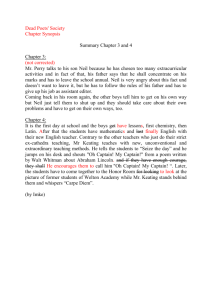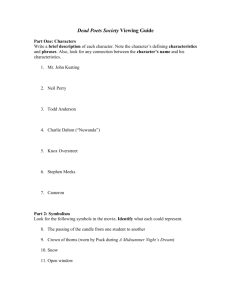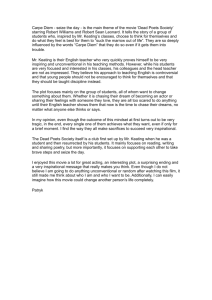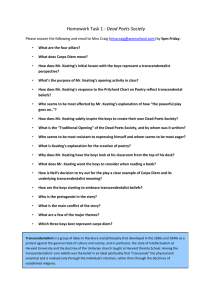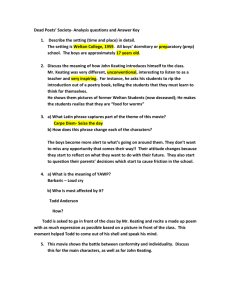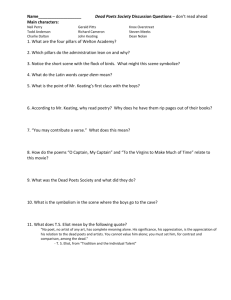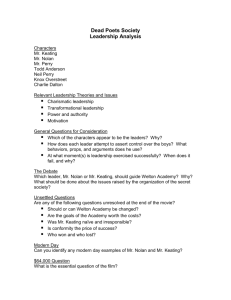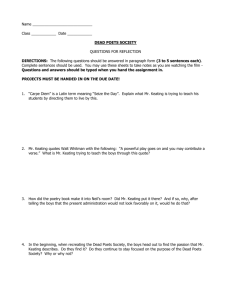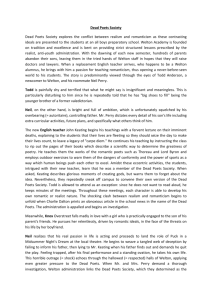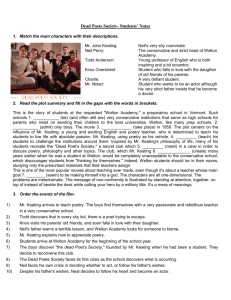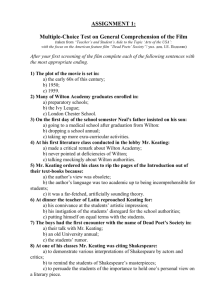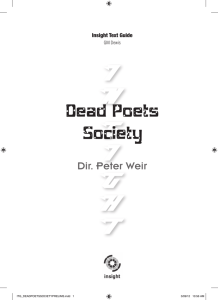Dead Poets Society Focus Questions
advertisement
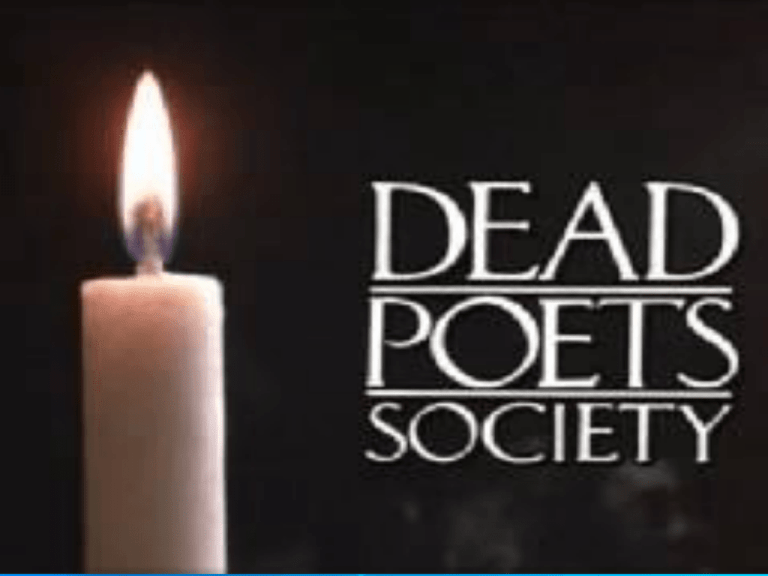
Literary Terms Copy the next two slides of information into the “Literary Terms” section of your notebook Elements of Fiction: Write this down • Plot = The Storyline • Theme = Main idea or moral of story • Setting = Where, when, why (context) • Characterization = • Protagonist = Main Character • Antagonist = Causes conflict for the protagonist Symbolism: Write This Down! • A symbol has meaning in itself, but stands for something else. However, a symbol is not what it symbolizes. • For example, a dove is a bird, but when used as a symbol it represents peace. If the dove dies, peace does not die. Focus Questions Dead Poets Society: Do not write down the question, simply answer them in your Cornell Notes for the movie Focus Questions • What does the candle symbolize? • What are the four pillars? • Who are the boys names that are attending Welton? Elements of Fiction • What does Carpe Diem mean? • How does Mr. Keating’s initial lesson with the boys represent a transcendentalist perspective? Focus Questions • How does Mr. Keating’s response to the Pritchard Chart on Poetry reflect transcendental beliefs? • Who seems to be most affected by Mr. Keating’s explanation of how “the powerful play goes on..”? • How does Mr. Keating subtly inspire the boys to create their own Dead Poets Society? Focus Questions •What were the original Dead Poets dedicated to? •Who left the poetry book for Neil to find? Focus Questions • What is the “Traditional Opening” of the Dead Poets Society, and by whom was it written? • Who seems to be most resistant to expressing himself and whom seems to be most eager? Focus Questions • What is Keating’s explanation for the creation of poetry? • Why does Mr. Keating have the boys look at his classroom from the top of his desk? • What does Mr. Keating want the boys to consider when reading a book? Focus Questions • How is Neil’s decision to try out for the play a clear example of Carpe Diem and its underlying transcendentalist meaning? • How are the boys starting to embrace transcendentalist beliefs? Focus Questions • What does the “barbaric ‘yawp’” have to do with transcendentalism? • What did Todd Anderson do to be able to create an improvised poem? • How was his poem an example of transcendentalism? Focus Questions • What does Knox Overstreet do to embrace carpe diem? • Why does Mr. Keating make the boys march in the quad? • In relation to marching, how does Charlie exercise his transcendental right? Focus Questions • What’s significant about Charlie changing his name to Nuwanda and inviting girls to the Dead Poets Society? • How were Nuwanda’s and Knox’s recent actions the antithesis of Carpe Diem and how does Mr. Keating explain that to them? Focus Questions • How are Neil’s actions regarding his father’s desire to have him quit the play not transcendental? • Why does Mr. Keating want to teach at Welton and how is his reason transcendental? Focus Questions • How was Knox not caring about Chris’s response when he read the poem to her transcendental? • How is Nuwanda’s lightening bolt a transcendental symbol? Focus Questions • How is Neil’s soliloquoy at the end of the play really a commentary on his relationship with his father? Focus Questions • How are Neil’s actions in the window symbolic of a Christ figure? • How did the words Mr. Perry said to Neil before the play come back to haunt him? Focus Questions •Why does Neil’s death symbolically take place in the winter? Focus Questions • What is the deeper meaning of “sucking the marrow out of life”? • Why does Welton view Mr. Keating as the one responsible for Neil’s death? Focus Questions • How are the boys’ actions at the end of the story transcendental? • Who finally embraced the notion of Carpe Diem, and why is this so? Focus Questions • How did the boys standing on the desks in defiance of Mr. Nolan represent Thoreau’s essay “Civil Disobedience”? Literary Terms Copy the following quote into your Cornell Notes “I went to the woods to live deliberately, to front only the essential facts of life, and see if I could not learn what it had to teach and not, when I came to die, discover that I had not lived. I did not wish to live what was not life, living is so dear; nor did I wish to practice resignation, unless it was quite necessary. I wanted to live deep and suck out all the marrow of life.” Literary Terms Answer the following literary questions in your Cornell Notes • • • • Focus Questions Who is the protagonist in the story? What is the main conflict of the story? What are a few of the major themes? What is type of conflict is the main conflict? • Character v. Character • Character v. society • Character v. nature • Character v. self Focus Questions • What is the deeper meaning of “sucking the marrow out of life”? • Why does Welton view Mr. Keating as the one responsible for Neil’s death?
